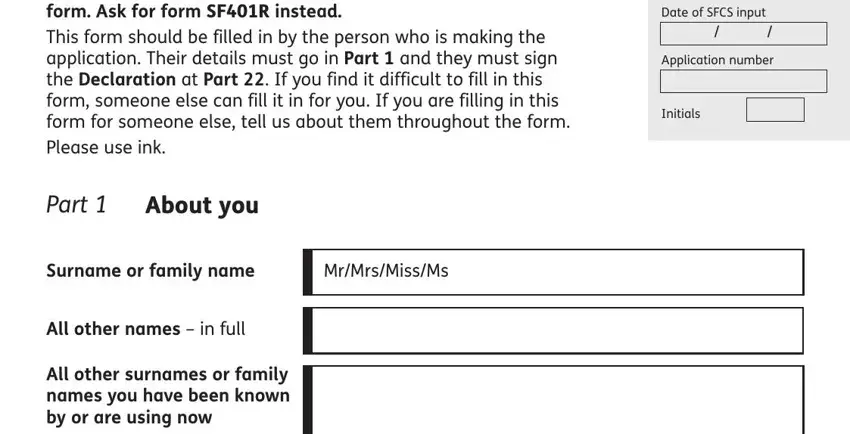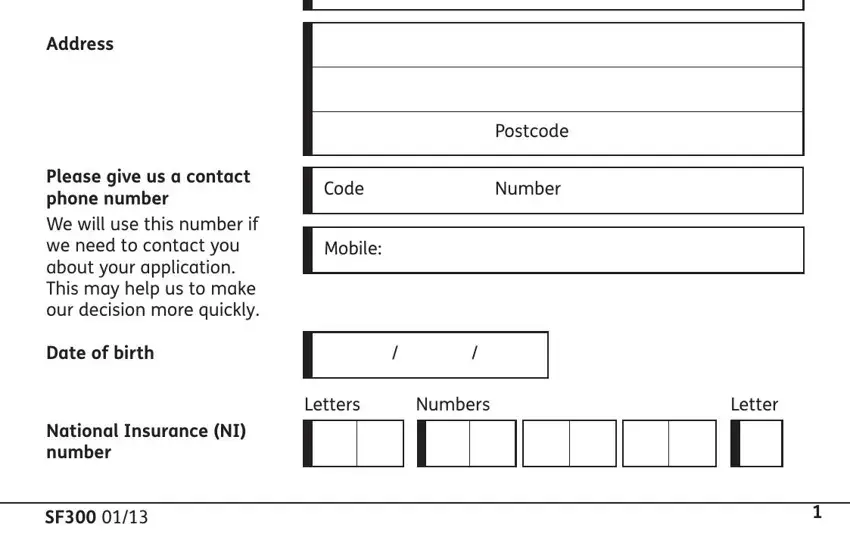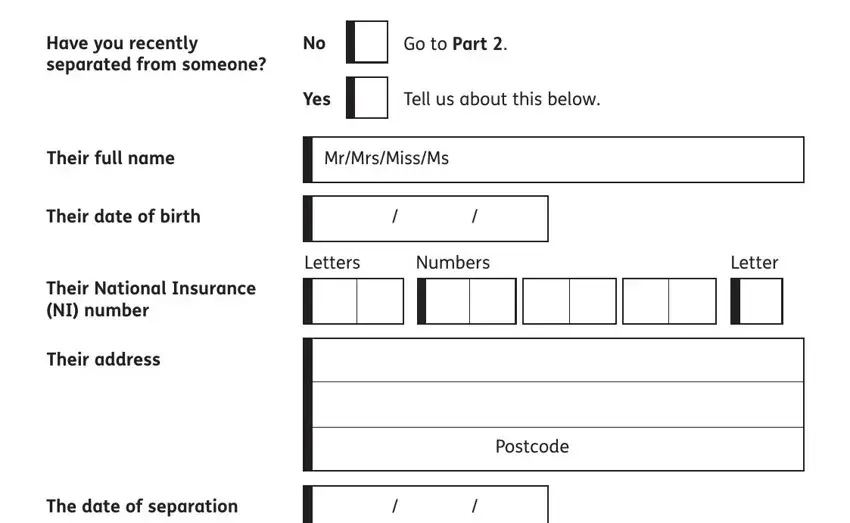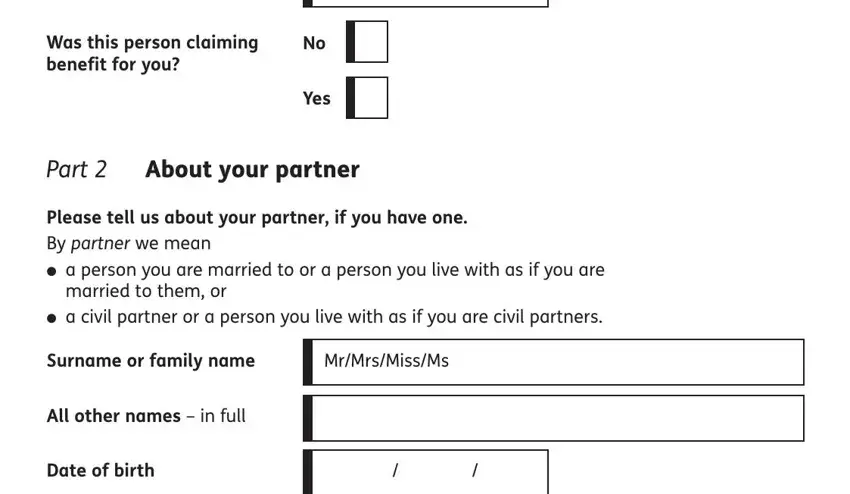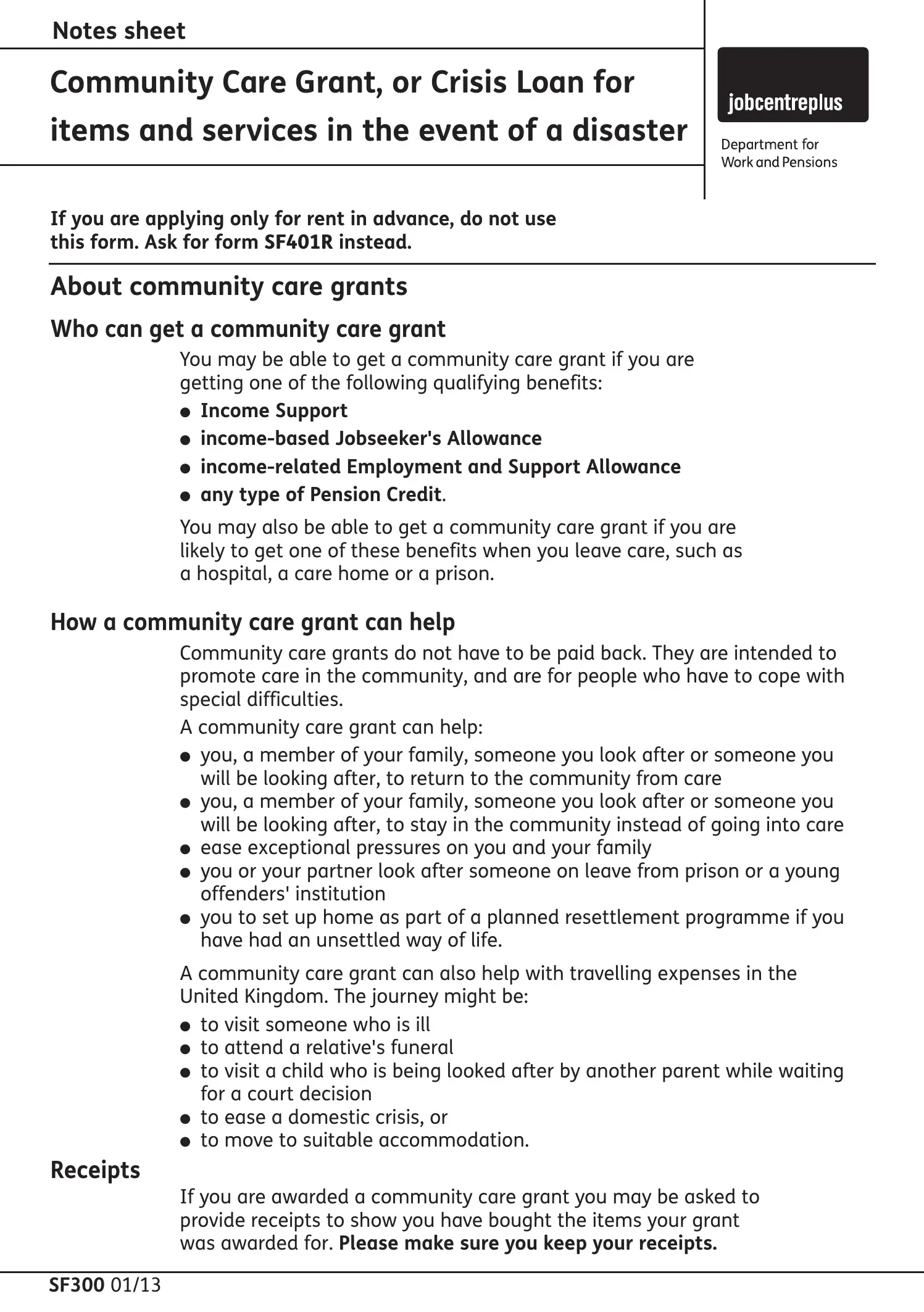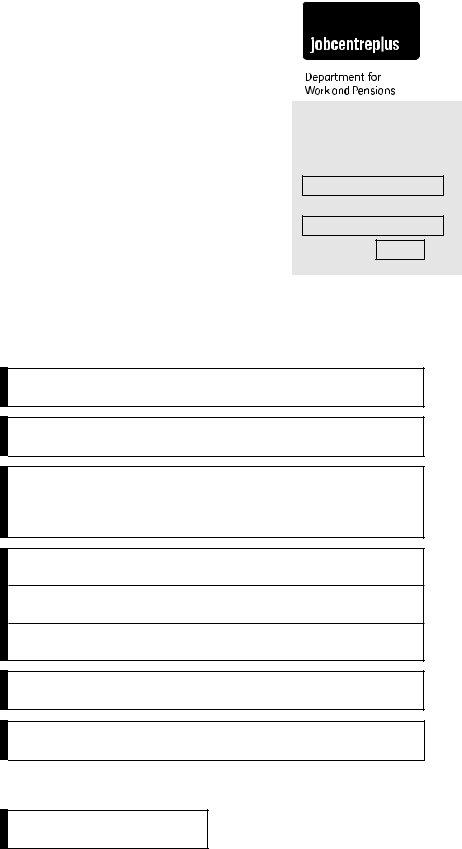Notes sheet
Community Care Grant, or Crisis Loan for
items and services in the event of a disaster
If you are applying only for rent in advance, do not use this form. Ask for form SF401R instead.
About community care grants
Who can get a community care grant
You may be able to get a community care grant if you are getting one of the following qualifying benefits:
lIncome Support
lincome-based Jobseeker's Allowance
lincome-related Employment and Support Allowance
lany type of Pension Credit.
You may also be able to get a community care grant if you are likely to get one of these benefits when you leave care, such as a hospital, a care home or a prison.
How a community care grant can help
Community care grants do not have to be paid back. They are intended to promote care in the community, and are for people who have to cope with special difficulties.
A community care grant can help:
lyou, a member of your family, someone you look after or someone you will be looking after, to return to the community from care
lyou, a member of your family, someone you look after or someone you will be looking after, to stay in the community instead of going into care
lease exceptional pressures on you and your family
lyou or your partner look after someone on leave from prison or a young offenders' institution
lyou to set up home as part of a planned resettlement programme if you have had an unsettled way of life.
A community care grant can also help with travelling expenses in the United Kingdom. The journey might be:
lto visit someone who is ill
lto attend a relative's funeral
lto visit a child who is being looked after by another parent while waiting for a court decision
lto ease a domestic crisis, or
lto move to suitable accommodation.
Receipts
If you are awarded a community care grant you may be asked to provide receipts to show you have bought the items your grant was awarded for. Please make sure you keep your receipts.
SF300 01/13
Notes About your application
About Crisis Loans
Who can get a Crisis Loan for items or services in the event of a disaster
You may be able to get a Crisis Loan for items or services if:
lyou are aged 16 or over, and
lyou do not have enough money to meet the cost of an item or service for you and your family, if you have one, in the event of a disaster, and
lthere is no other way to prevent serious damage or serious risk to the health or safety of yourself or a member of your family if that item or service is not provided.
You do not need to be getting a benefit for a Crisis Loan for items or services in the event of a disaster.
What is a disaster?
Disasters are events of great or sudden misfortune, such as major flooding, a gas explosion, a chemical leak or a house fire, but not minor mishaps or damage.
This list is not exhaustive.
How you repay a loan
If we can pay you a Crisis Loan for items or services in the event of a disaster, we will ask you to agree to repay it and agree the way you will repay it before we make the payment. We will look at what you can afford before we decide the arrangements for repayments.
If you are getting a benefit we will take the money back in weekly repayments. If you or your partner do not get any benefits we will arrange the repayment of the loan with you.
If, later, you have problems making the repayments you have agreed to, we may be able to help. For example we could reduce the repayment amount by extending the repayment period. Your Jobcentre Plus office can give you advice about this.
Keep this page for your information
Notes About your application
How we decide what we can pay you
Grant
The decision maker will look at all the information on your application before deciding if we can make a payment. There is only a limited amount of money available for grants so we cannot make a payment in every case.
The information you give us on the form will help us decide:
lif your expenses qualify for a payment, and if so
lwhether we can make a payment from the money we have in the budget.
You are more likely to get a payment if it will play an important part in helping you cope with special circumstances and will meet the aims of community care grants.
Loan
If you do not qualify for a grant, we may make you a loan instead if:
lyou are over 16, and
lwe decide that your claim is because of a disaster and there is no other way to prevent serious damage or serious risk to the health and safety of you or a member of your family.
Other help from the Social Fund
Budgeting Loans
You may be able to get a Budgeting Loan if:
lyou have been getting Income Support, income-based Jobseeker’s Allowance, income-related Employment and Support Allowance, or Pension Credit for at least 26 weeks, and
lyou need help:
–to buy furniture or household equipment
–to buy clothing and footwear
–to pay rent in advance and/or removal expenses to secure fresh accommodation
–to pay for home improvements, maintenance or security
–with travelling, maternity and funeral expenses
–to pay for things to help you look for or start work
–to repay HP or other debts that have been taken out.
Savings – Budgeting Loans
lIf you and your partner are aged under 61, savings of more than £1,000 may affect the amount of money you can get.
lIf you or your partner are aged 61 or over, savings of more than £2,000 may affect the amount of money you can get.
Budgeting Loans have to be paid back but they are interest free.
Notes Other help from the Social Fund continued
Other Crisis Loans
You may be able to get a Crisis Loan to help with paying
lrent in advance
lboard and lodging in advance
lhostel charges
if:
lyou are aged 16 or over, and
lin an emergency or because of a disaster, you do not have enough money to pay rent in advance, advance board and lodging or hostel charges, and there is no other way to prevent serious damage or serious risk to the health, or safety, of yourself or a member of your family, or
lyou are moving out of a care home or institutional care, and
lyour new tenancy is not for local authority accommodation, and
lyou have a Community Care Grant to help you get established.
You may be able to get a Crisis Loan for day to day living expenses if:
lyou are aged 16 or over, and
lin an emergency or because of a disaster you do not have enough money to meet the immediate needs of you and your family for day to day living expenses.
You may not be able to get a Crisis Loan for day to day living expenses if you have already had 3 or more of these payments in the last year.
Crisis Loans have to be paid back, but they are interest free.
More help and advice
If you want more information about help from the Social Fund
lGet in touch with your local office. You can find the phone number and address in the business numbers section of the phone book. Look under Jobcentre Plus or Social Security.
For more information about benefits and services
lvisit www.direct.gov.uk
lGet in touch with an advice centre like the Citizens Advice Bureau.
Community Care Grant, or Crisis Loan for items and services in the event of a disaster
If you are applying only for rent in advance, do not use this form. Ask for form SF401R instead.
This form should be filled in by the person who is making the application. Their details must go in Part 1 and they must sign the Declaration at Part 22. If you find it difficult to fill in this form, someone else can fill it in for you. If you are filling in this form for someone else, tell us about them throughout the form.
Please use ink.
For office use only
Date of SFCS input
/ /
Application number
Initials
Surname or family name
All other names – in full
All other surnames or family names you have been known by or are using now
Address
Please give us a contact phone number
We will use this number if we need to contact you about your application. This may help us to make our decision more quickly.
Date of birth
National Insurance (NI) number
